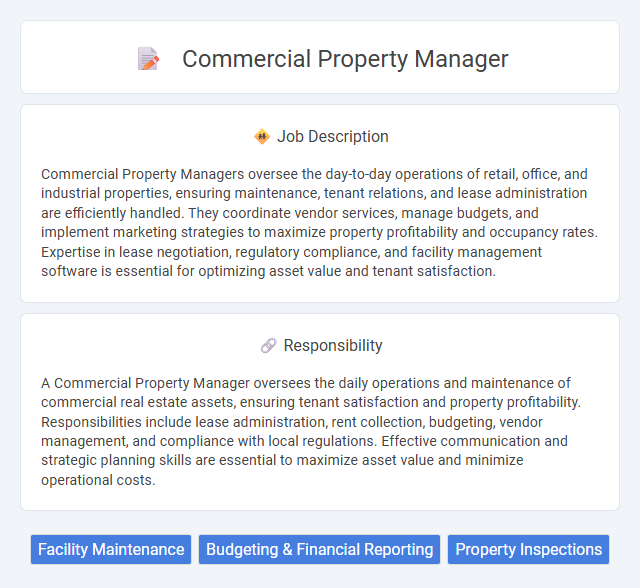
Commercial Property Managers oversee the day-to-day operations of retail, office, and industrial properties, ensuring maintenance, tenant relations, and lease administration are efficiently handled. They coordinate vendor services, manage budgets, and implement marketing strategies to maximize property profitability and occupancy rates. Expertise in lease negotiation, regulatory compliance, and facility management software is essential for optimizing asset value and tenant satisfaction.
Individuals with strong organizational skills and a proactive attitude are likely to excel as commercial property managers. Those comfortable with multitasking, problem-solving, and effective communication may find this role suitable due to frequent interactions with tenants and vendors. Candidates who thrive under pressure and can manage complex logistical details probably have a higher chance of success in this position.
Qualification
A Commercial Property Manager must possess a bachelor's degree in real estate, business administration, or finance to effectively oversee property operations and tenant relations. Strong knowledge of property management software, commercial leasing laws, and financial reporting is essential for managing budgets, contracts, and maintenance schedules efficiently. Proven experience in negotiation, marketing, and facilities management enhances the ability to maximize property value and ensure tenant satisfaction.
Responsibility
A Commercial Property Manager oversees the daily operations and maintenance of commercial real estate assets, ensuring tenant satisfaction and property profitability. Responsibilities include lease administration, rent collection, budgeting, vendor management, and compliance with local regulations. Effective communication and strategic planning skills are essential to maximize asset value and minimize operational costs.
Benefit
Commercial Property Managers are likely to benefit from the opportunity to enhance tenant satisfaction and retention through effective property oversight and maintenance strategy. There is a strong probability that their role includes maximizing property value and rental income, which can lead to potential financial bonuses or career advancement. They might also experience professional growth by coordinating diverse teams and navigating complex property regulations, offering valuable industry expertise.
Challenge
Managing commercial properties likely involves navigating complex tenant relationships and addressing maintenance issues promptly to minimize operational disruptions. The role probably requires balancing financial objectives with compliance to regulatory standards, which may pose significant challenges. Efficient communication and problem-solving skills are expected to be critical for handling emergencies and unexpected property-related complications effectively.
Career Advancement
Commercial Property Managers coordinate leasing, maintenance, and tenant relations, optimizing property value and income streams. Gaining certifications such as CPM (Certified Property Manager) and experience in financial analysis can significantly enhance career progression opportunities. Advancement often leads to senior roles like Asset Manager or Director of Property Management, combining strategic planning with portfolio oversight.
Key Terms
Facility Maintenance
Commercial Property Managers oversee facility maintenance to ensure optimal building operations and tenant satisfaction. They coordinate regular inspections, manage repair schedules, and supervise maintenance staff to prevent structural issues and equipment malfunctions. Efficient facility maintenance directly impacts property value, operational costs, and compliance with safety regulations.
Budgeting & Financial Reporting
Commercial Property Managers oversee budgeting by preparing detailed financial plans that forecast income, expenses, and capital expenditures for efficient property operations. They conduct regular financial reporting, analyzing variances and ensuring compliance with financial policies to maximize profitability. Expertise in financial software and market trends supports accurate budget adjustments and strategic fiscal decision-making.
Property Inspections
Commercial Property Managers conduct thorough property inspections to assess the condition of buildings and ensure compliance with safety regulations. These inspections identify maintenance needs, potential hazards, and lease violations, enabling proactive management and preservation of asset value. Detailed inspection reports support decision-making and facilitate communication with tenants, vendors, and stakeholders.
 kuljobs.com
kuljobs.com